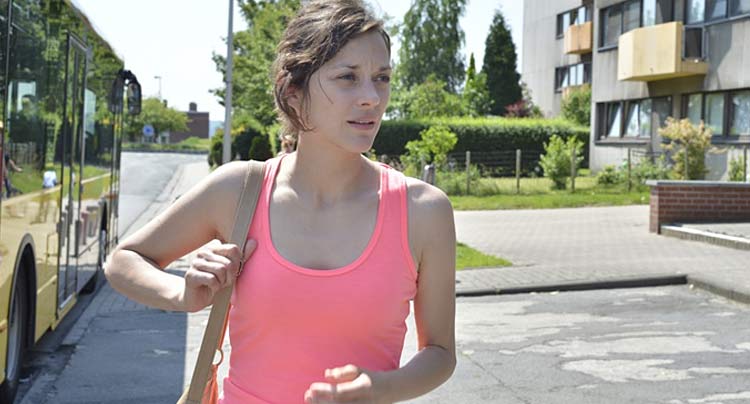
While too fabricated at times, the inner satisfaction and victorious sensation cannot be denied.

While too fabricated at times, the inner satisfaction and victorious sensation cannot be denied.
The Dardenne brothers, Jean-Pierre and Luc, are worshiped filmmakers in the art-house community. They have been impressing audiences since 1996’s The Promise and are among the distinguished few who have two Palme D’Ors to their name (for 1999’s Rosetta and 2005’s The Child). This year, the question is: can they be the first to get three? If the press screening reaction I was a part of this morning is any indication, the answer is louder than Obama’s “yes we can!”. Two Days, One Night premiered this morning and while every previous screening I’ve seen this early ended with a few appreciative claps from the groggy journalists, this one practically received a standing ovation. After their previous effort, 2011’s The Kid With A Bike, didn’t move audiences as much they’re usually capable of doing this one feels like a return to form for the Dardennes. Marion Cotillard gives a sensational performance, and is now the frontrunner for Best Actress. The simplicity of the story is matched only by the weight of the everyday struggle, something the Dardennes are masters of, and in this particular case a growing will power becomes truly inspirational. Though I’ve never personally counted myself among the Dardenne worshippers, I cannot deny the inner satisfaction and victorious sensation Two Days, One Night fills you with.
Cinema verite style is never so deftly handled as it is in the hands of the Dardenne brothers. Quiet conversations and seemingly mundane moments are given precedence over action, movements are followed and observed by a caring camera in a role of close companion, and the conflict rooted into the story is taken from the ordinary. Every major Dardenne film has the connecting thread of emptiness (be it the loss of a child, absence of a parent, etc.) that is in desperate need of filling. In the case of Two Days, One Night, it’s the absence of a job as Sandra (Cotillard) finds herself fighting for hers under pretty unusual circumstances. After a bout with depression, Sandra returned to work to find out about a vote that got her fired. The employees of her company were asked to choose between receiving bonuses (up to 1,000 extra Euros) or keeping Sandra on, because cut backs had to be made otherwise. Juliette, one of Sandra’s supporters convinces their boss to allow for another secret ballot to be held on Monday morning, to get the employees voting again without the influence of a heartless foreman. Sandra’s mission, urged on by her supporting husband Manu (Fabrizio Rongione), is to reach out to people over the weekend and try to convince them to vote for her so she can keep her job.

It’s the perfect Dardenne premise, because the fear of losing a job is one of the major universal subjects of our current state of affairs, and it’s action-less enough for that verite style to do its magic and pull you into Sandra’s casual, disheveled lifestyle. Cotillard is perfectly sympathetic, wearing her tail between her legs tightly enough to win over any cranky audience, her crying fits doing exactly what they’re constructed to; gain support on and off-screen. This touches upon one of my major issues with the film. Notwithstanding its inspirational and authoritative character, the film plays cleverly with some of Sandra’s idiosyncrasies and some of her colleagues’ reactions to her plight (Timur comes to mind) to a point of obvious fabrication. When some of the scenes become too designed to be real, it effectively pops the organic bubble and makes you realize; “oh wait, this is a movie.”
There is something a little rotten in the idea of this film winning the Palme; it would be a celebration of the everyday struggle by people who are privileged enough to never experience it (or at least, never again.) With two previous Palmes to their name, I’d say give it to someone who’s never won. It’s not like the competition is lacking in possibilities. However, Marion Cotillard seamlessly integrates herself into the Dardenne narrative and makes us forget how much of a superstar she is. For that, she should win her first Cannes Best Actress award.
Originally published on May 20th, 2014 during the Cannes Film Festival